Four years old, but still...
- Happy path with non-null
AutoCloseable
- Happy path with null
AutoCloseable
- Throws on write
- Throws on close
- Throws on write and close
- Throws in resource specification (the with part, e.g. constructor call)
- Throws in
try block but AutoCloseable is null
Above lists all 7 conditions - the reason for the 8 branches is due to repeated condition.
All branches can be reached, the try-with-resources is fairly simple compiler sugar (at least compared to switch-on-string) - if they cannot be reached, then it is by definition a compiler bug.
Only 6 unit tests are actually required (in the example code below, throwsOnClose is @Ingored and branch coverage is 8/8.
Also note that Throwable.addSuppressed(Throwable) cannot suppress itself, so the generated bytecode contains an additional guard (IF_ACMPEQ - reference equality) to prevent this). Luckily this branch is covered by the throw-on-write, throw-on-close and throw-on-write-and-close cases, as the bytecode variable slots are reused by the outer 2 of 3 exception handler regions.
This is not an issue with Jacoco - in fact the example code in the linked issue #82 is incorrect as there are no duplicated null checks and there is no nested catch block surrounding the close.
JUnit test demonstrating 8 of 8 branches covered
import static org.hamcrest.Matchers.arrayContaining;
import static org.hamcrest.Matchers.is;
import static org.hamcrest.Matchers.sameInstance;
import static org.junit.Assert.assertThat;
import static org.junit.Assert.fail;
import java.io.IOException;
import java.io.OutputStream;
import java.io.UncheckedIOException;
import org.junit.Ignore;
import org.junit.Test;
public class FullBranchCoverageOnTryWithResourcesTest {
private static class DummyOutputStream extends OutputStream {
private final IOException thrownOnWrite;
private final IOException thrownOnClose;
public DummyOutputStream(IOException thrownOnWrite, IOException thrownOnClose)
{
this.thrownOnWrite = thrownOnWrite;
this.thrownOnClose = thrownOnClose;
}
@Override
public void write(int b) throws IOException
{
if(thrownOnWrite != null) {
throw thrownOnWrite;
}
}
@Override
public void close() throws IOException
{
if(thrownOnClose != null) {
throw thrownOnClose;
}
}
}
private static class Subject {
private OutputStream closeable;
private IOException exception;
public Subject(OutputStream closeable)
{
this.closeable = closeable;
}
public Subject(IOException exception)
{
this.exception = exception;
}
public void scrutinize(String text)
{
try(OutputStream closeable = create()) {
process(closeable);
} catch(IOException e) {
throw new UncheckedIOException(e);
}
}
protected void process(OutputStream closeable) throws IOException
{
if(closeable != null) {
closeable.write(1);
}
}
protected OutputStream create() throws IOException
{
if(exception != null) {
throw exception;
}
return closeable;
}
}
private final IOException onWrite = new IOException("Two writes don't make a left");
private final IOException onClose = new IOException("Sorry Dave, we're open 24/7");
/**
* Covers one branch
*/
@Test
public void happyPath()
{
Subject subject = new Subject(new DummyOutputStream(null, null));
subject.scrutinize("text");
}
/**
* Covers one branch
*/
@Test
public void happyPathWithNullCloseable()
{
Subject subject = new Subject((OutputStream) null);
subject.scrutinize("text");
}
/**
* Covers one branch
*/
@Test
public void throwsOnCreateResource()
{
IOException chuck = new IOException("oom?");
Subject subject = new Subject(chuck);
try {
subject.scrutinize("text");
fail();
} catch(UncheckedIOException e) {
assertThat(e.getCause(), is(sameInstance(chuck)));
}
}
/**
* Covers three branches
*/
@Test
public void throwsOnWrite()
{
Subject subject = new Subject(new DummyOutputStream(onWrite, null));
try {
subject.scrutinize("text");
fail();
} catch(UncheckedIOException e) {
assertThat(e.getCause(), is(sameInstance(onWrite)));
}
}
/**
* Covers one branch - Not needed for coverage if you have the other tests
*/
@Ignore
@Test
public void throwsOnClose()
{
Subject subject = new Subject(new DummyOutputStream(null, onClose));
try {
subject.scrutinize("text");
fail();
} catch(UncheckedIOException e) {
assertThat(e.getCause(), is(sameInstance(onClose)));
}
}
/**
* Covers two branches
*/
@SuppressWarnings("unchecked")
@Test
public void throwsOnWriteAndClose()
{
Subject subject = new Subject(new DummyOutputStream(onWrite, onClose));
try {
subject.scrutinize("text");
fail();
} catch(UncheckedIOException e) {
assertThat(e.getCause(), is(sameInstance(onWrite)));
assertThat(e.getCause().getSuppressed(), is(arrayContaining(sameInstance(onClose))));
}
}
/**
* Covers three branches
*/
@Test
public void throwsInTryBlockButCloseableIsNull() throws Exception
{
IOException chucked = new IOException("ta-da");
Subject subject = new Subject((OutputStream) null) {
@Override
protected void process(OutputStream closeable) throws IOException
{
throw chucked;
}
};
try {
subject.scrutinize("text");
fail();
} catch(UncheckedIOException e) {
assertThat(e.getCause(), is(sameInstance(chucked)));
}
}
}

Caveat
Though not in OP's sample code, there is one case that can't be tested AFAIK.
If you pass the resource reference as an argument, then in Java 7/8 you must have a local variable to assign to:
void someMethod(AutoCloseable arg)
{
try(AutoCloseable pfft = arg) {
//...
}
}
In this case the generated code will still be guarding the resource reference. The syntatic sugar is updated in Java 9, where the local variable is no longer required: try(arg){ /*...*/ }
Supplemental - Suggest use of library to avoid branches entirely
Admittedly some of these branches can be written off as unrealistic - i.e. where the try block uses the AutoCloseable without null checking or where the resource reference (with) cannot be null.
Often your application doesn't care where it failed - to open the file, write to it or close it - the granularity of failure is irrelevant (unless the app is specifically concerned with files, e.g. file-browser or word processor).
Furthermore, in the OP's code, to test the null closeable path - you'd have to refactor the try block into a protected method, subclass and provide a NOOP implementation - all this just get coverage on branches that will never be taken in the wild.
I wrote a tiny Java 8 library io.earcam.unexceptional (in Maven Central) that deals with most checked exception boilerplate.
Relevant to this question: it provides a bunch of zero-branch, one-liners for AutoCloseables, converting checked exceptions to unchecked.
Example: Free Port Finder
int port = Closing.closeAfterApplying(ServerSocket::new, 0, ServerSocket::getLocalPort);


